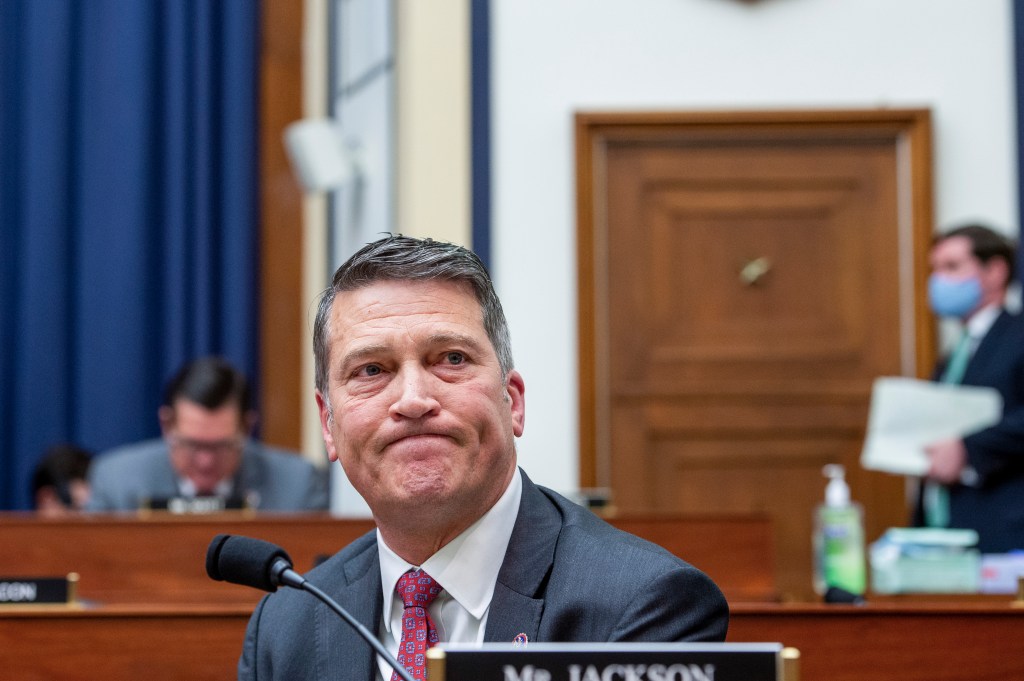As rioters stormed the U.S. Capitol on Jan. 6, 2021, certain members of the Oath Keepers learned that a U.S. Congress member needed “help” from their militia.
“Dr. Ronnie Jackson—on the move. Needs protection,” wrote an unidentified Oath Keeper in a text message at 3:08 p.m. “If anyone inside cover him. He has critical data to protect.” (Jackson’s first name is spelled Ronny.)
Videos by VICE
Moments later, Oath Keeper leader Stewart Rhodes responded. “Help with what?” he replied. “Give him my cell.”
These text messages surfaced Monday in a letter from the House Select Committee that’s investigating the violent Capitol riot. And the lawmakers have a lot of questions. So far, 11 Oath Keepers, including Rhodes, have been charged with seditious conspiracy in connection to the riot. Two of those Oath Keepers have pleaded guilty.
“Why would these individuals have an interest in your specific location?” the committee asked in their letter, as an example of the kind of question they’d be putting to Jackson. “Why would they believe you ‘have critical data to protect?’ Why would they direct their members to protect your personal safety? With whom did you speak by cell phone that day?”
The committee sent the letter as a request to interview Jackson, who’s now a Republican representative in Texas, along with two of his Republican colleagues, Rep. Andy Biggs of Arizona and Rep. Mo Brooks of Alabama, as part of their investigation. The lawmakers are particularly interested in whether Jackson and the Oath Keepers communicated before, during, or after the riot. The committee hopes to meet with all three congressmen the week of May 9.
Jackson, along with Biggs and Brooks, were outspoken proponents of the “Stop the Steal” conspiracy, which brought thousands of Trump supporters to Washington, D.C., on Jan. 6. Before he was elected to Congress in 2020, Jackson was best known as the White House doctor from 2013 to 2018. He earned the nickname “Candyman” because of his free-wheeling approach to handing out prescription drugs, according to NPR, and he famously hyped the president’s health and genes. Trump later nominated him to run Veterans Affairs, although he withdrew from the process over allegations of improper behavior.
The Jan. 6 committee is also interested in the ties between Biggs, Brooks, and other known far-right activists or extremists. In the letter to Biggs, lawmakers wrote that they are aware Stop the Steal activist Ali Alexander publicly claimed that he and Biggs, plus two other members of Congress, cooked up the plan together to bring protesters to D.C. on Jan. 6, the day that the 2020 election results were expected to be certified.
“We would like to understand precisely what you knew before the violence on Jan. 6 about the purposes, planning, and expectations for the march on the Capitol,” they wrote.
Their interest in Brooks—once an ardent Trump loyalist—hinges on recent comments he made about the former president, according to the letter.
“The president has asked me to rescind the election of 2020,” Brooks told WIAT, a local Alabama TV station, in March. “He always brings up, ‘We’ve got to rescind the election. We got to take Joe Biden down and put me in now.’” The letter quoted these remarks verbatim.
Brooks also told CNN that Trump continued to pressure him to rescind the election results even after Jan. 6.
Brooks’ allegations against Trump came shortly after the former president had withdrawn his endorsement from the Alabama congressman in his bid for re-election. Trump accused Brooks of having gone “woke” by dropping the issue of the 2020 election on the campaign trail.
Want the best of VICE News straight to your inbox? Sign up here.




